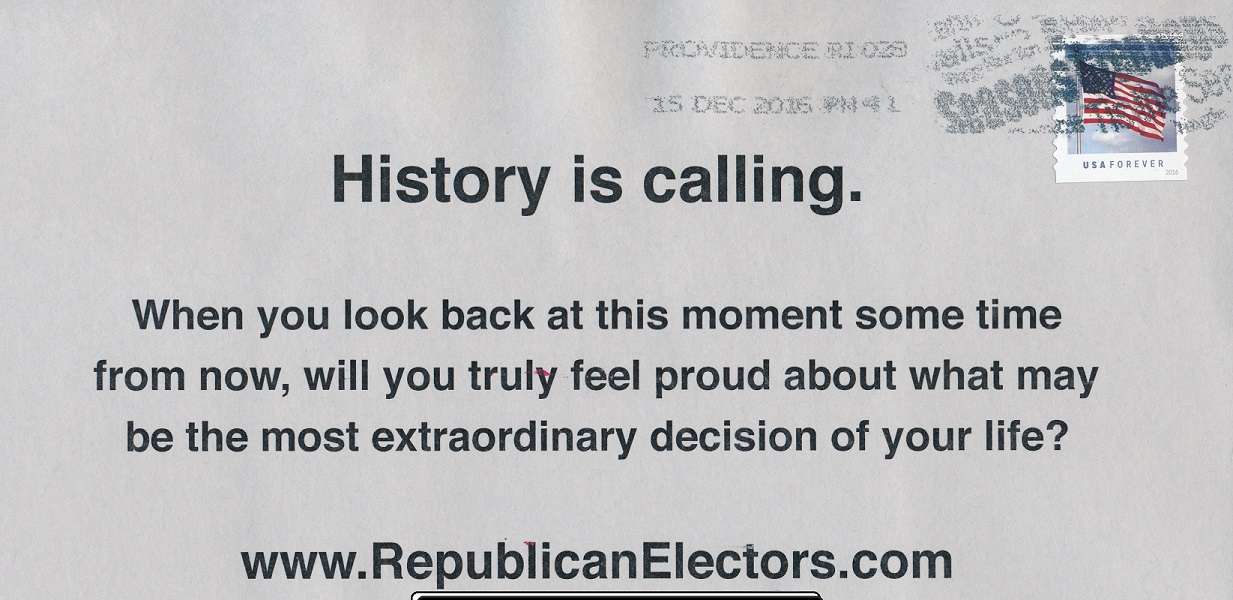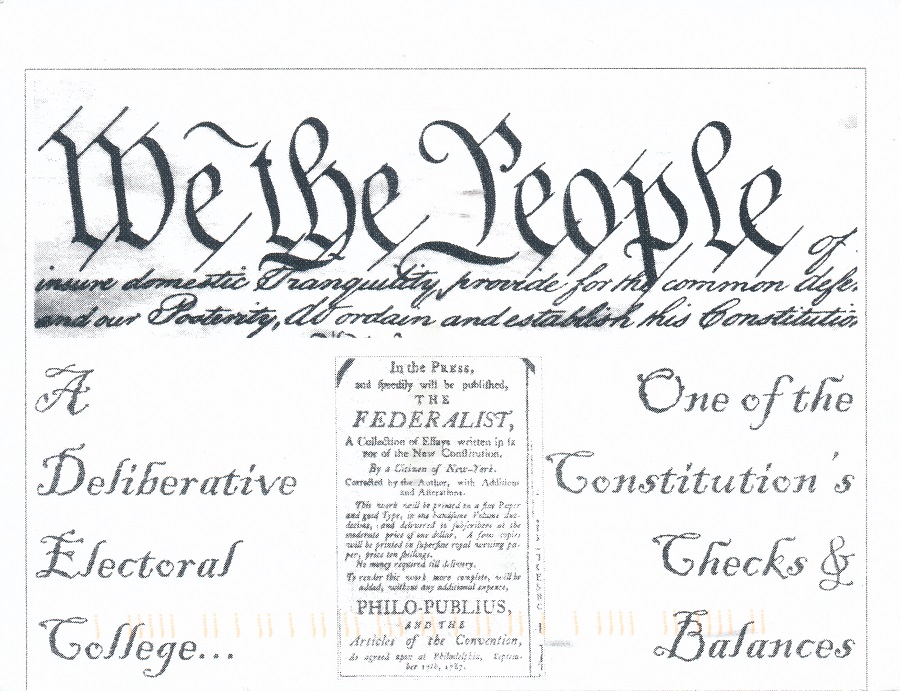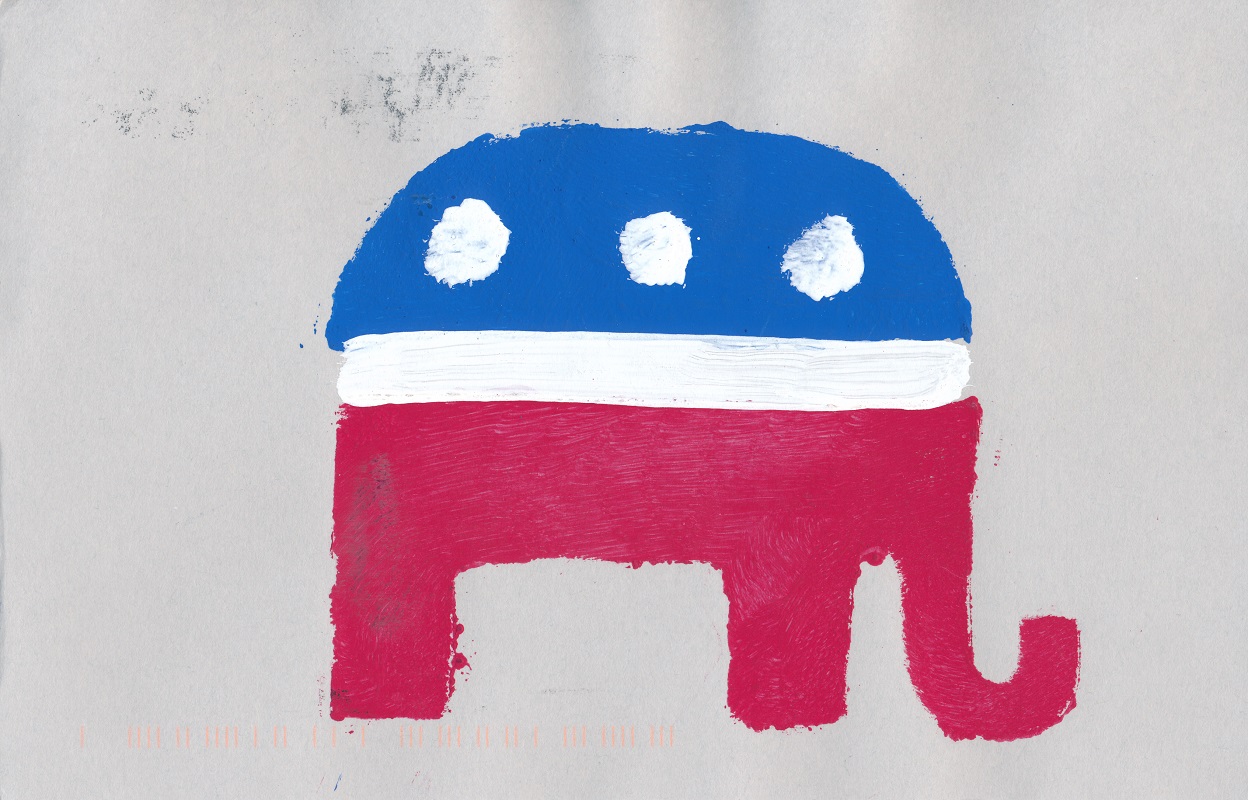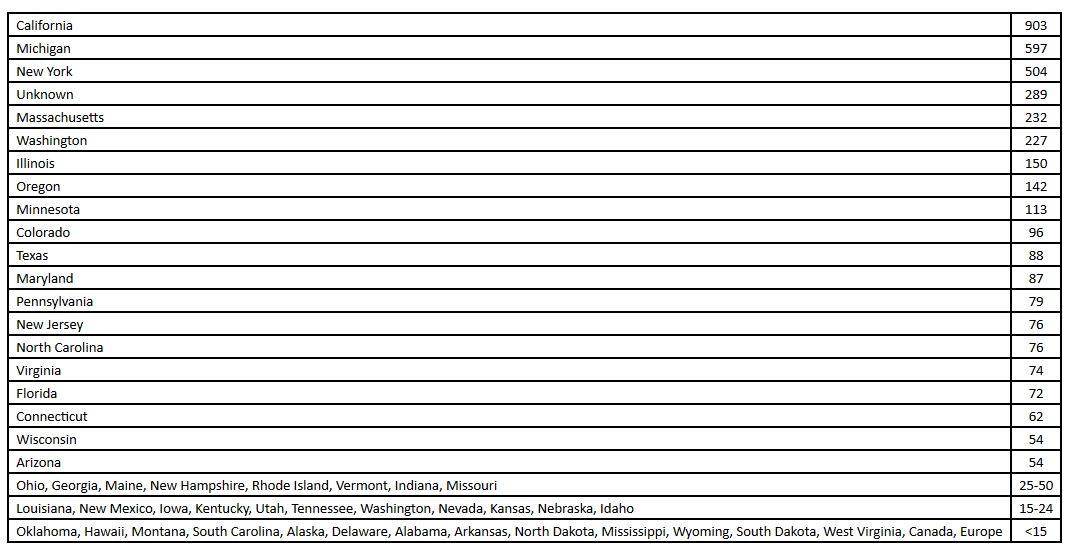2016 Michigan Electors Correspondence Collection
This collection includes correspondence received by Michigan electors in the weeks between Donald Trump’s electoral victory on November 8 and the meeting of the Electoral College on December 19, 2016. Americans from across the country joined a letter writing campaign and sent thousands of letters to electors, urging them to not vote for the presumed president-elect.

Cover of a postcard received by a Michigan Elector
History
The 2016 presidential election was incredibly close in Michigan, requiring some counties to do a recount. Donald Trump earned 2,279,543 votes, while Hilary Clinton garnered 2,268,839 -- a difference of only 10,704.
The 16 members of Michigan’s Electoral College met at the Michigan Capitol building in Lansing, where they cast their votes for Donald Trump on December 19th, 2016.
In Michigan, a slate of electors is chosen at each party’s state convention to represent the party’s presidential nominee. Michigan, like 47 other states, uses a statewide popular-vote election to allocate all of its electoral votes. After the results of the popular election are in, it is the electors who represent the winning candidate participate as electors who cast the formal, legal votes for President of the United States. In Michigan, as in many other states, these electors are required to vote for the candidate who won the state’s popular vote by the state’s Constitution.
Michigan Election Law also mentions that if an elector were to not vote for the winner of the popular vote, his or her vote would be thrown out and another elector who will follow the will of the people is identified so they can cast that vote.
In the period between the November 8 popular vote and the meeting of the electors there were a number of attempts to get electors to note cast their votes for Donald Trump in key states like Michigan.
Jeff Strabone, from New York state, set up a website to help people write to members of the electors across the nation. He listed the postal addresses of all electors and created a downloadable letter template laying out constitutional and political arguments for the electors to not vote for the presumed president-elect. The site also had information about the history of the Electoral College and attempts to abolish it, as well as support information for “faithless electors,” namely electors who do not vote for the candidate that won the state’s popular vote.
At the same time, Daniel Brezenoff started an online petition, “Electoral College: Make Hillary Clinton President,” which accumulated 4,917,959 supporters – a record for change.org . His change.org page also encouraged people to write letters to the electors. In the press and on social media, a debate developed on electors’ duties, the so-called “faithless electors,” and the constitutional history of the Electoral College.*
Strabone’s initiatives went viral. Electors in Michigan and other states received thousands of letters and postcards. Some were simply the text of the template prepared by Strabone, but others were customized and some were even highly personal.
At least one Electoral College member, Christopher Suprun from Texas, decided to change his vote and explained in an op-ed published by the New York Times that he believed Donald Trump was not fit for office.
In Michigan, no electors changed their votes; again, they are required to follow the outcome of the statewide vote. One elector, Michael Banerian, reported in several media appearances that he had received emails threatening him if he were to vote for Donald Trump.
Scope and Contents
The collection contains 4,569 letters and postcards from all 50 states, including 4,370 letters to Michael Banerian, 151 to Ross Ensign, 1 to another elector in Ohio that was accidentally sent to Banerian, and 47 attachments (articles, pictures or other items).

Of the 4,569 total 3,759 are form letters, 85 form postcards. There are 539 personal letters and 112 personal postcards.
While a large majority of writers were asking electors not to vote for Donald Trump, 6 expressed support of the Republican candidate.

In addition, some senders included copies of newspaper articles to support their request. Because the letter campaign took place in December, a significant number of people also included Christmas and holiday cards along with their New Year’s wishes.
The letters all follow a similar format, acknowledging that the elector position is important and that we are in an important time in history. The letters then typically give reasons why the author believed Donald Trump was unfit to be president. Authors seemed to want electors to make a statement by voting for anyone other than Trump, and many letters contained the phrase, “join the faithless electors.”
The letters came from all 50 states.

Michigan comes in second place and sent more letters to these electors than any other state that voted Republican. New York and California – two large states that typically vote for the Democrat candidate for president – rank first and third respectively. Every state is represented by at least one letter, which is a testament to how important this presidential election was to people across America. There were even letters from Canada, the United Kingdom, France, Belgium, Switzerland, and the Netherlands. They were sent by U.S. citizens who live abroad but were concerned for their native country.
Sometimes, the writers provided information about themselves. Some were retirees while others were working people, including doctors, lawyers, and psychologists. There was also students in college and graduate school, and even a 7- and an 11-year-old. Most of them did not ask electors to vote for Hilary Clinton, but simply to withhold their vote for Donald Trump. Most letters highlighted their concerns with Russia’s alleged involvement in the election. Many letters also took issue with individuals Donald Trump had proposed to put in cabinet during the presidential transition, which seemed, to the authors, to contradict his “drain the swamp” promise, as well as his overall fitness for office.
In addition, the collection includes miscellaneous official letters and invitations regarding the meeting of the Michigan Electoral College and the Inauguration of the new president.
For more information on the collection and how to access it, see the finding aid.
Research and original writing by Andrew Tesner, political science intern, Summer 2018; edited by Dominique Daniel and David Dulio.
--------------------
* "Conversation with Brooklyn’s Jeff Strabone on how his Electoral College website went crazy viral," Brooklyn Daily Eagle, Dec. 15, 2016




